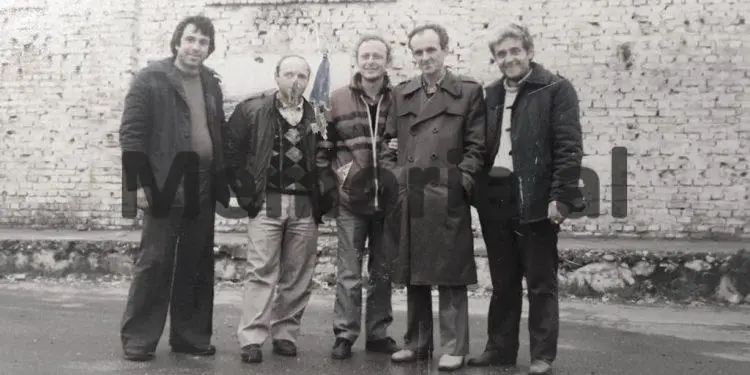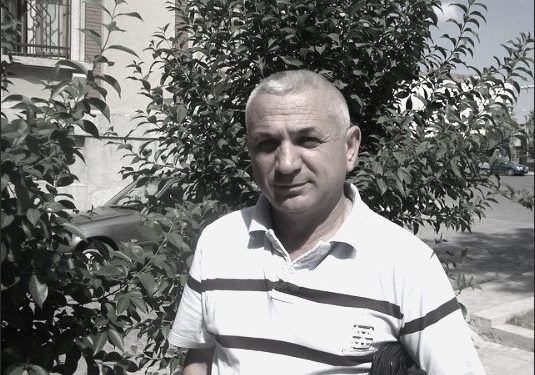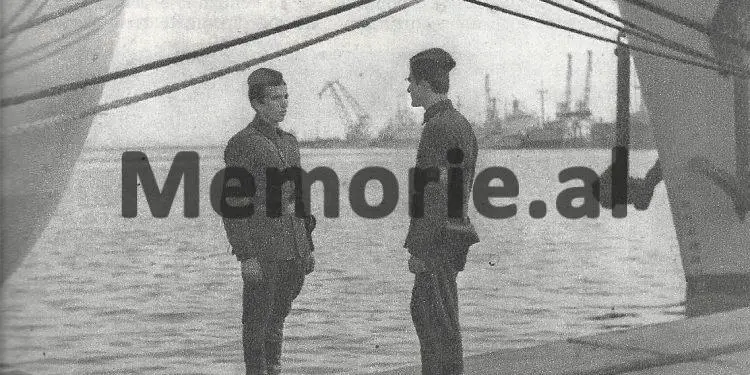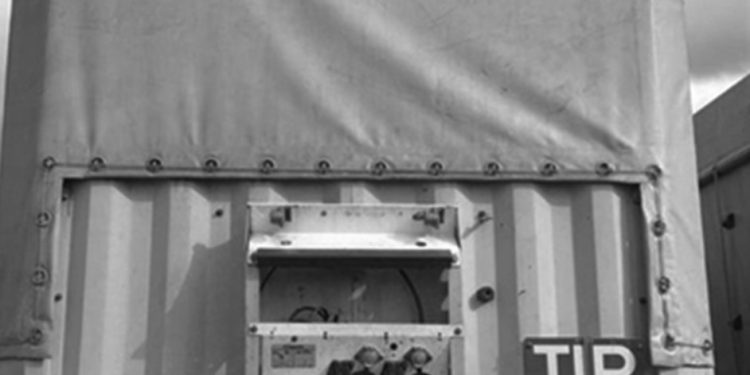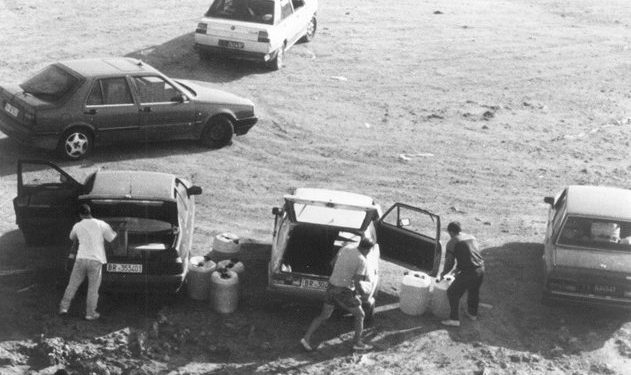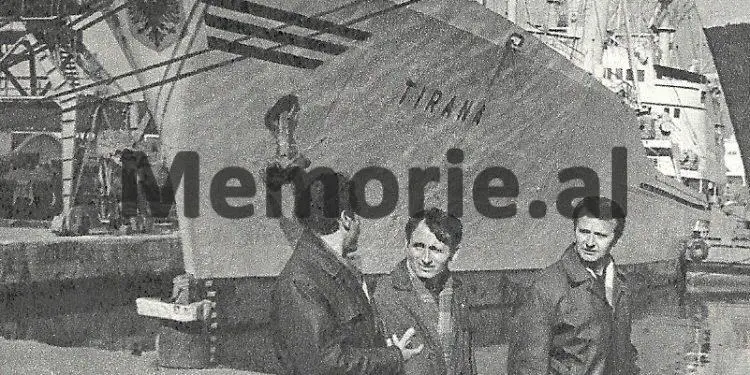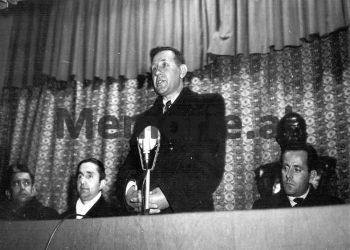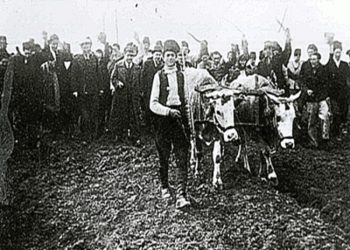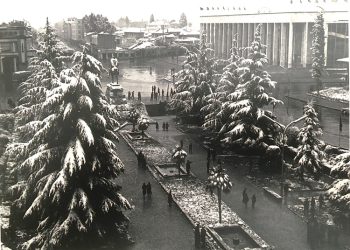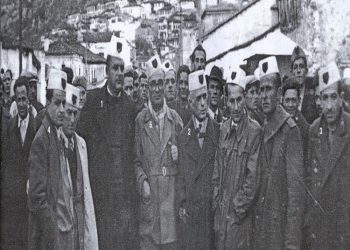By Mark Brunga
Memorie.al / In the early 1980s, an Italian speedboat loaded at Pier 0 of the port, as soon as it left the basin, collided with an underwater object and its stern was torn open on the right side. The barn that was full of cigarettes took on water and the stacks of various cigarettes floated to the surface of the sea. The “Maister Wind”, as the sailors call it, carried the cargo of precious cigarettes towards the shores of the beach. The entire coast of Durrës was filled with cigarettes, which were collected by the population of the area. The army also appeared on the shore to collect them, but with a slight delay.
The population collected a large amount and for a long time they were freely consumed in the city. They were rare cigarettes, which had not been seen anywhere, but only in modern Hollywood films of the types “Marlboro”, “Chesterfield”, “Multifilter”, “Puro” etc. The boat was pulled ashore in the former area of the old shipyard and was taken over for repair by a team from this shipyard.
At that time, an excellent team of specialists worked at this shipyard, such as: Tasim Balla, Stilo Pali, Muho Kacerja, Ron Zhura, Muhamet Tula, Ymer Karaboja, etc., who made an excellent repair of the cracked part by rebuilding the completely damaged surface and replacing the main and outer covering of the wooden boat’s bow.
Then the caulking, bolting, etc. were carried out. Meanwhile, the boat’s crew members stayed at the shipyard completely free, drinking coffee with the workers in the shipyard’s cafe, a mixed cafe next to the old warehouses and the former shipyard management of that period. Everyone knew that they were Italian smugglers. A secret activity that everyone knew how and where it was carried out with the blessing of the communist state. The cigarettes were brought to Albania by a Franco-Swiss import-export company, “Vanawer Ltd”.
To bring them to Durrës in the warehouses of Kodra e Rrashbullit, where there were also state reserves, TIR trucks arrived, then they were loaded onto boats inside the port, with a workforce made up of soldiers who were performing military service with the troops of the Ministry of Interior, (Rep. 324, otherwise known as the Security Battalion, installed in Linxë, Tirana), but who did not have the classic uniforms. Instead, they were dressed in sports suits.
Of the foreigners on the boat crew, the old secret service officer, Qazim Myftiu, the godfather of this smuggling, known as “Signor Antonio”, who often came to the shipyard, stood out. The all-powerful leader of “Albtrans”, which had taken the form of a free-trade point for the storage, manipulation and delivery of internationally smuggled cigarettes, which was played out during this period. Mainly of the brands: “Marlboro-red”, and “Marlboro-box” of “Philip-Morris”, as well as “Winston”. Also, and secondary brands, “Kim”, “Murati-Ambasador”, “Lucky-Strike”, “Dunhill”, “Chesterfield” etc.
CIGARETTE SMUGGLING IN DURRA
Much has been written about the widespread cigarette smuggling in Durrës. This smuggling, officially carried out by the state through a specially established enterprise administered by the State Security, has brought to light many facts, but also many legends, which are still rumored in the urban circles of Durrës. Among which it is said that the trade in automatic weapons, produced in secret factories of our country, in Poliçan and Gramsh, was also developed. The scheme of how this state smuggling functioned was as stated:
In the processing of the maritime vehicles that loaded on behalf of “Albtrans”, at a special dock of the Port of Durrës known as pier 0, the port entities participated: the State Maritime Agency of the Port of Durrës, the Port Captaincy, the Interclub and the Naval Shipyard; the Border Crossing checkpoint; the soldiers of the Albtrans warehouse in their dynamics, who were engaged in loading and unloading by the Security Battalion, (Rep. 324), the Coastal Defense military units, the Border Crossing checkpoints Hani i Hotit, Qafë-Thanë, Kakavijë, Rinas, etc.
Abroad, they knew their business partners, the transport companies that transported the goods from Northern and Central Europe, to the full address: Rrashbull–Durrës–Albania. This address was known by cargo insurance companies, etc. Fisherman Pask Allkanjari, indicated that the movements of boats were dense in a period of time, with the direction Durrës-Italy. Later, boat transport was added to the boats. Transport for which the head of this activity, after the Mufti’s retirement, Lorenc Nënshati, writes in his memoirs that a quantity of goods also went by boat. Especially those addressed to Spain.
SMUGGLING AND ITS “UNDER-FLOORS”
Smuggling has been developed for a long time. From 1967 to 1991. During this period, since the flow of tobacco stacks that were circulating was large, there was also a flow of this article. Mainly from soldiers who were used for loading and unloading on transport barges, as well as on boats that smuggled them to Italy. This same article fell mainly into the hands of merchant ship sailors, who then exchanged them in foreign markets for other goods in short, supply in Albania, providing considerable income.
A kind of variant of smuggling that was gradually transferred from the state to specific individuals who dared to challenge it. It was a “subculture” of smuggling. In 1988, it was a damp autumn night, in Durrës there was police retaliation in the port and outside it.
During this night, a number of people ended up in the cells of the Internal Affairs Branch. Meanwhile, searches were also carried out in their homes, where a large amount of imported materials were seized, including clothes, watches, tape recorders and currency. Even “Marlboro” cigarettes, which were used as currency, to exchange goods with foreign sailors, in the holds of ships that were loaded in the port, or were taken by sailors of Albanian ships and exchanged in Italy for other materials.
In this case, the exchanges were carried out on a Vietnamese ship. The “Marlboro” cigarettes were being used by the smugglers as a kind of clearing house. Meanwhile, senior secret service officers were more often seen at the port’s Interclub and at the “Volga” and “Dajti” hotels, consuming original elite cigarettes of the most prestigious American brands. They were not smuggling in this case, but they had multifaceted connections with this activity, originating from the Rrashbull warehouses, in the suburban hills of the city of Durrës. Where did this “small smuggling” come from?
Nënshati writes in his memoirs that the goods had their own prices. In recent years, the warehousewomen would give him a hard time for one or two fewer boxes of cigarettes when the goods were loaded onto ships. All the employees smoked “Marlboro” cigarettes, which they took from the warehouses, but also from the ships when they delivered the goods. Foreign sailors were given cigarettes, and they also had a cigarette budget, to stimulate good relations with the employees of “Albtrans”. – In 1991, the phenomena of theft, – as Nënshati says, – became worrying.
The soldiers began to steal so much that they created inventory deficits…! “Once we went to the Battalion ourselves and selected them. But the next day we found out”, Nënshati continues, “that not all of them were our chosen ones, among them they had brought us the thieves of the Security Battalion, instructed by the apostates to steal cigarettes…! This was not the work of soldiers; it was the officers who planned the thefts through the soldiers…”!
FOREIGN PERSONNEL WHO OPERATED IN TRANSPORT
According to the director of the last years of “Albtrans” activity, Lorenc Nënshati, the smugglers had a very low level of education and training. None of them had completed the compulsory “lower” secondary school, according to the laws of their country of origin, and even the semi-literates dominated. The individualistic work they did had almost cut them off from true human feelings. From a young age they entered the cigarette smuggling circle, inherited from their grandfather and father. Due to their poor education, they also had many character flaws.
“As an espionage contingent,” Nënshati emphasizes, “they were suitable for the special forces of the Italian Finance Guards, who controlled cigarette smuggling, through the smuggling contingent. None of them could be caught, because they were not agents of that powerful weapon at sea and on land. The principle of the boatmen was to use a double game: they denounced their colleagues, in order to privilege the realization of their work.
Their job was to load the goods from the dock, or from the ‘mother’ ships on the high seas and find the opportunity, at any cost, to deliver them to Italian soil without being detected, by trickery or by risking their lives at any time. This work gave them good income.”
HOW WERE THE SMUGGLING SHIPS FOLLOWED BY THE REGIMENT’S OBSERVERS?
At that time, it was known that cigarette smuggling was taking place in the Port, under the auspices of special sections of the State Security. Their arrival and departure were closely monitored by the Reconnaissance of the 4th Coastal Artillery Regiment of Durrës. According to the former Chief of Staff of this regiment, Vladimir Duda, the head of the steering group would receive notification 24 hours in advance of the arrival of smuggling ships in Durrës.
In this preliminary notification, specific data was obtained for each boat or other vehicle that would enter or leave the port of Durrës. Then, the head of the steering group would notify all the reconnaissance points of the number of smuggling ships that would move, the direction, the quadrant of the maritime sector where they would pass, as well as the exact time. The reconnaissance units, upon spotting them in depth, would immediately report and follow them until they entered the port.
THE END OF “ALBTRANS”
In 1991, the smuggling activity came to an end. “Albtrans” had started with a positive profit balance of 1 million dollars and had reached a profit of 40 million in 1991. “Albtrans”, according to its leaders, was a capitalist enterprise that showed its superiority within the atrophied economy of the communist state, since 3-4 years before the transition, no foreign currency was entering the bank. Foreign trade was blocked in bank accounts, due to debts. The only economic resources in foreign currency for the state were the income of “Albtrans”, which had reached 40 million dollars per year. Memorie.al




